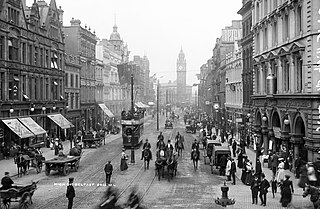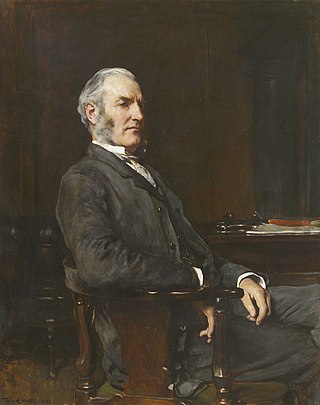| |||||
| Centuries: | |||||
|---|---|---|---|---|---|
| Decades: | |||||
| See also: | 1862 in the United Kingdom Other events of 1862 List of years in Ireland | ||||
Events from the year 1862 in Ireland.
| |||||
| Centuries: | |||||
|---|---|---|---|---|---|
| Decades: | |||||
| See also: | 1862 in the United Kingdom Other events of 1862 List of years in Ireland | ||||
Events from the year 1862 in Ireland.

Harland & Wolff is a British shipbuilding and fabrication company headquartered in London with sites in Belfast, Arnish, Appledore and Methil. It specialises in ship repair, shipbuilding and offshore construction. Harland & Wolff is famous for having built the majority of the ocean liners for the White Star Line, including Olympic-class trio – RMS Olympic, RMS Titanic and HMHS Britannic. Outside of White Star Line, other ships that have been built include the Royal Navy's HMS Belfast; Royal Mail Line's Andes; Shaw, Savill & Albion's Southern Cross; Union-Castle's RMS Pendennis Castle; P&O's Canberra; and Hamburg-America's SS Amerika of 1905. Harland and Wolff's official history, Shipbuilders to the World, was published in 1986.

Larne is a town on the east coast of County Antrim, Northern Ireland, with a population of 18,853 at the 2021 census. It is a major passenger and freight roll-on roll-off port. Larne is administered by Mid and East Antrim Borough Council. Together with parts of the neighbouring districts of Antrim and Newtownabbey and Causeway Coast and Glens, it forms the East Antrim constituency for elections to the Westminster Parliament and Northern Ireland Assembly. The civil parish is in the historic barony of Glenarm Upper.

Thomas Andrews Jr. was a British businessman and shipbuilder. He was managing director and head of the drafting department of the shipbuilding company Harland and Wolff in Belfast, Ireland.

William James Pirrie, 1st Viscount Pirrie, KP, PC, PC (Ire) was a leading British shipbuilder and businessman. He was chairman of Harland and Wolff, shipbuilders, between 1895 and 1924, and also served as Lord Mayor of Belfast between 1896 and 1898. He was ennobled as Baron Pirrie in 1906, appointed a Knight of the Order of St Patrick in 1908 and made Viscount Pirrie in 1921. In the months leading up to the 1912 Titanic disaster, Lord Pirrie was questioned about the number of life boats aboard the Olympic-class ships. He responded that the great ships were unsinkable and the rafts were to save others. This would haunt him forever. In Belfast he was, on other grounds, already a controversial figure: a Protestant employer associated as a leading Liberal with a policy of Home Rule for Ireland.
Events from the year 1920 in Ireland.
Events from the year 1914 in Ireland.
Events from the year 1913 in Ireland.
Events in the year 1911 in Ireland.
Events in the year 1910 in Ireland.
Events in the year 1902 in Ireland.
Events from the year 1899 in Ireland.

Glenfarne or Glenfarn is a village in north County Leitrim, Ireland. It is the site of the original Ballroom of Romance, which inspired a short story by William Trevor that was subsequently turned into a television film in a BBC/RTÉ co-production. Glenfarne has a lakeside forest near Lough MacNean. The village is located on the N16 (Sligo–Blacklion) road, east of Manorhamilton.

Belfast is the capital of Northern Ireland, and throughout its modern history has been a major commercial and industrial centre. In the late 20th century manufacturing industries that had existed for several centuries declined, particularly shipbuilding. The city's history has occasionally seen conflict between different political factions who favour different political arrangements between Ireland and Great Britain. Since the Good Friday Agreement, the city has been relatively peaceful and major redevelopment has occurred, especially in the inner city and dock areas.
Events from the year 1886 in Ireland.

Gustav Wilhelm Wolff was a German-born British shipbuilder and politician. Born in Hamburg, he moved to Liverpool in 1849 to live with his uncle, Gustav Christian Schwabe. After serving his apprenticeship in Manchester, Wolff was employed as a draughtsman in Hyde, Greater Manchester, before being employed by the shipbuilder Edward Harland in Belfast as his personal assistant. In 1861, Wolff became a partner at Harland's firm, forming Harland and Wolff. Outside shipbuilding, Wolff served as a Belfast Harbour Commissioner. He also founded the Belfast Ropeworks, served as Member of Parliament for Belfast East for 18 years and as a member of the Conservative and Unionist Party and Irish and Ulster Unionist parties.
Events during the year 1957 in Northern Ireland.
This is a list of events that happened in Northern Ireland in 1944.
Events during the year 1943 in Northern Ireland.

Sir Edward James Harland, 1st Baronet, was an Ulster-based English shipbuilder and politician. Born in Scarborough in the North Riding of Yorkshire, he was educated at Edinburgh Academy. In 1846, aged 15, he took an apprenticeship at the engineering works of Robert Stephenson and Company in Newcastle upon Tyne. Afterwards he was employed in jobs in Glasgow and again in Newcastle, before moving to Belfast in 1854 to manage Robert Hickson's shipyard at Queen's Island. Four years later he bought the yard and renamed the business Edward James Harland and Company. In 1861 he formed a business partnership with Gustav Wilhelm Wolff, his former personal assistant, creating Harland and Wolff. Later, Harland recruited William James Pirrie as another partner. Edward Harland, Gustav Wolff and William James Pirrie maintained a successful business, receiving regular orders from the White Star Line, before Harland's retirement in 1889, leaving Wolff and Pirrie to manage the shipyard.
Captain Sir Walter Alexander Edmenson, CBE, DL was a British businessman, shipowner and public administrator.